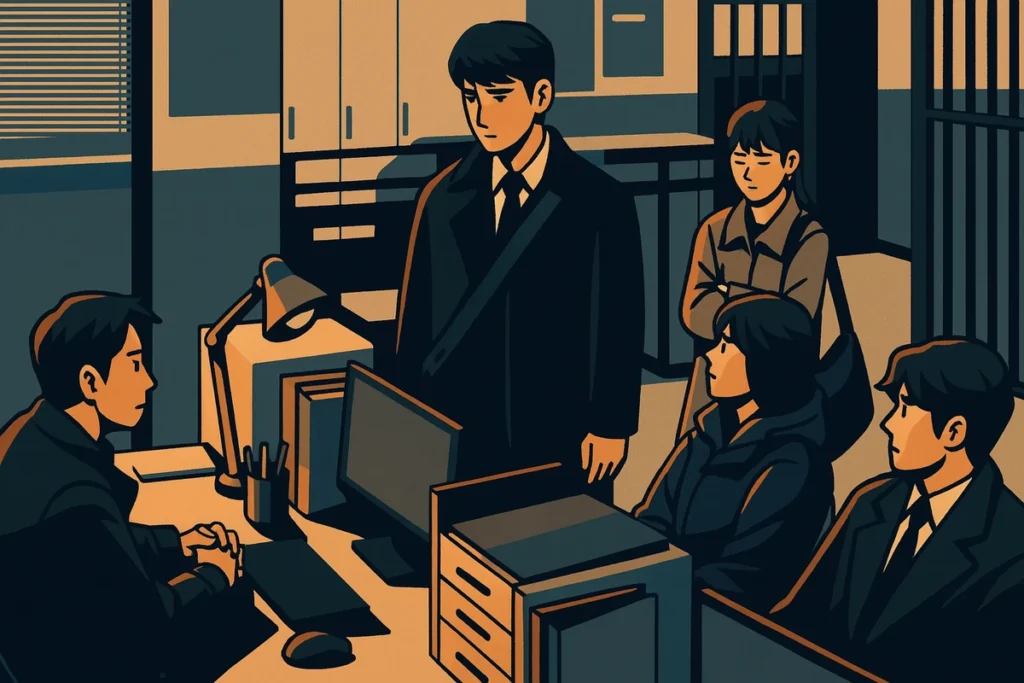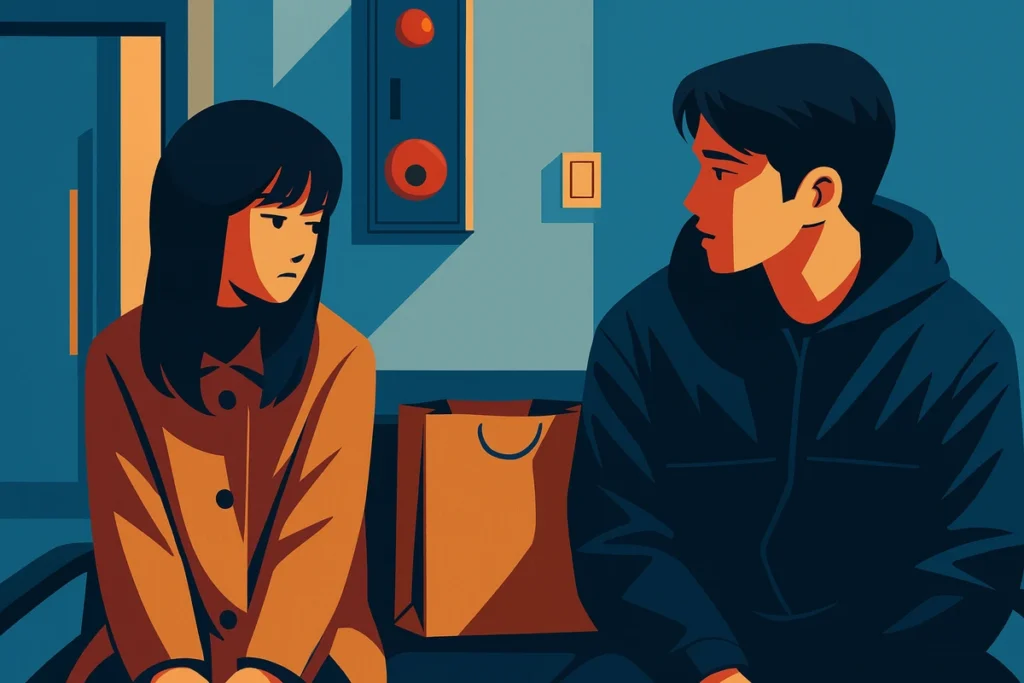[Image Source] AI illustration by DALL·E
TL;DR – Bluntness can be love.
In Be Melodramatic, Jin-joo's sharp sarcasm isn’t cruelty—it’s emotional vetting.
Her relentless questioning of her sister’s boyfriend is a crash course in Korean-style affection: testing love through awkward honesty and playful aggression.
This scene decodes how Koreans often express sincerity not through softness, but through emotional trials wrapped in humor, status shifts, and code-switching.

1. Scene Snapshot
A café filled with awkward tension and mismatched intentions. Im Jin-joo, witty and emotionally sharp, confronts her younger sister’s boyfriend with a barrage of pointed questions. She isn’t just testing him—she’s testing love itself. Every line she throws out sounds exaggerated, even rude. But this is Korean sincerity in disguise: love hidden in sarcasm, care disguised as teasing. In contrast, the boyfriend stands his ground with polite answers, unsure whether he’s passing the test or walking into a trap.
This scene is a crash course in Korean emotional communication, where humor and discomfort blur, and sincerity is measured not by words, but by how you survive being roasted.
📺 Watch the original scene here
[Source] YouTube, 1분드라마모음zip
2. Micro-Dialogue
2-1. 너 돈 많진 않지?
You’re not exactly rich, are you?
2-2. 시작부터 직설적이네.
That’s a blunt way to start.
2-3. 너 지영이 진심으로 좋아해?
Do you truly like Ji-young?
2-4. 사랑합니다.
I love her.
2-5. 그거 주길 바라는 거 아냐. 마음만 있으면 돼.
I’m not asking you to give it—to have the heart.
3. Culture & Subtext
What looks like emotional bullying is affection—Korean style. In many Korean families, especially among siblings, teasing isn’t just tolerated, it’s expected. Jin-joo’s grilling isn’t cruel; it’s a form of vetting, a dramatic trial to test sincerity without ever asking directly.
Notice how she mixes 반말 and 높임말. She teases him with a childish nickname while responding with formal verbs like “사랑하는데요?” It’s emotional code-switching: he must stay respectful, even while being teased.
Money—“3천원” vs. “3억”—isn’t just about numbers. It’s symbolic. Can you give everything, no matter how much or how little? That’s the real question.
The drama also captures a more profound truth in Korean romantic culture: expressing love isn’t about saying “I love you.” It’s about showing that you’ll stay, even when the other person acts like they don’t know your heart.
❓ FAQ (Frequently Asked Questions)
Q1. Why are Korean drama characters often so blunt when talking about love or money?
Many Korean dramas reflect cultural norms where emotional honesty is expressed indirectly—or through exaggerated directness. Asking “너 가난하지?” (You’re poor, aren’t you?) might sound rude, but in context, it’s a way of testing sincerity and values rather than judging someone’s wealth.
Q2. Why do characters switch between 반말 and 존댓말 in the same sentence?
This is emotional code-switching. For example, teasing someone with a playful nickname while ending a sentence with “사랑하는데요?” reflects a layered emotional tone—mockery, concern, and hierarchical awareness—all happening at once. It’s very common in Korean conversations, especially when age or status is involved.
Q3. What does “감히 이해할 수 있는 동물이 아니야” really mean?
Literally: “Not a creature you can dare to understand.” It’s an exaggerated metaphor, meant to emphasize emotional complexity. Korean often uses dramatic metaphors to intensify meaning. In this case, it means: “Don’t try to analyze women—just act with sincerity.”
Q4. Is this kind of sarcasm common in Korean relationships?
Yes, especially among siblings, friends, or during emotional confrontations. Reddit and Quora users often describe Korean teasing as “savage but loving.” It’s a way to test emotional truth without sounding too direct or vulnerable.
Q5. How should learners handle this kind of sarcastic or testing dialogue?
Stay respectful and sincere. When the boyfriend replies “사랑하는데요?” (I love her, though), he shows emotional strength without being defensive. That’s often the best way to respond in Korean—honest but calm.
4. Grammar in Action
5. Natural Korean Toolkit
뜻밖의 첫 질문 = an unexpected but engaging opening remark
→ Variants: 놀라운 첫마디, 예상치 못한 시작
A start to a conversation that immediately surprises or intrigues the listener.
네 지갑에 얼마 있니 = how much cash do you have in your wallet
→ Casual. Older form: 돈지갑 (money pouch)
A lighthearted or teasing way to ask about the amount of money someone is carrying.
줄 수 있니 / 줄 수 있습니다 = can you give / I am able to give it
→ Informal vs formal usage, with tone affecting emotional impact
A phrase used to check someone’s willingness or ability to give something.
그걸 원한다고 한 적 없어 = I never said I wanted that
→ Suggests the emphasis is on the thought or intention, not the item itself
A clarification that the real value lies in sincerity rather than possession.
마음을 보여줘 = show your heart
→ In Korean, this is tied to clear actions or words rather than vague feelings
Encourages openly expressing feelings through tangible behavior.
아는 척하지 마 = don’t pretend you know
→ Often used in drama dialogue to create tension or misdirection
Tells someone not to act as if they understand when they don’t.
긴장하지 마 = don’t be nervous
→ Commonly paired with 편하게 해 (make yourself comfortable)
A friendly reminder to stay relaxed and calm.
최선을 다해 봐 = try your best
→ Can be sincere encouragement or playful teasing depending on tone
Motivates someone to put forth their maximum effort.
꼬맹이 = kiddo
→ Playful nickname, sometimes teasing but affectionate
Used to refer to a younger person in a familiar and friendly way.
6. Quick Quiz or Expression Drill
Fill in the blank with the correct expression:
6-1. 상대가 잘 모른다면 __________.
→ keep showing it until she understands
6-2. 나는 그 돈을 달라고 __________.
→ I never even said I wanted that money
6-3. __________ 없어질 리 없어. 걱정 마.
→ She’s not going to disappear, don’t worry
6-4. 너무 불안해하지 말고 그냥 __________.
→ Stay calm and give it your best.
📍 Want to Decode the Language Beneath the Drama?
If Jin-joo’s sharp words made you pause, it’s time to explore the deeper layers—how omission, ambiguity, honorifics, and everyday expressions carry unspoken meaning in Korean.
- 🔖 Beyond Grammar: The Art of Omission in Korean
- 🔖 Understanding Korean Ambiguity: A Guide to the Beauty of Multilayered Expressions
- 🔖 Korean Honorifics vs. Informal Speech: Master the Basics with Practical Examples
🎥 More from This Drama? Let’s Keep Learning Korean! - Currently writing
Loved this scene? There’s more where that came from. Check out other moments from the same drama—each packed with new Korean phrases, cultural vibes, and teachable emotions.
- 🔖 Blunt But Loving: Learn Real Korean from a Savage Love Test Scene
- 🔖 Korean Drinking Culture & “Some” Relationships: Be Melodramatic Scene Decoded
Answers
6-1. 상대가 잘 모른다면 알 때까지 계속 보여줘.
→ keep showing it until they understand
6-2. 나는 그 돈을 달라고 말한 적 없어.
→ I never even said I wanted that money
6-3. 그녀가 없어질 리 없어. 걱정 마.
→ She’s not going to disappear, don’t worry
6-4. 너무 불안해하지 말고 그냥 최선을 다해봐.
→ Stay calm and give it your best


